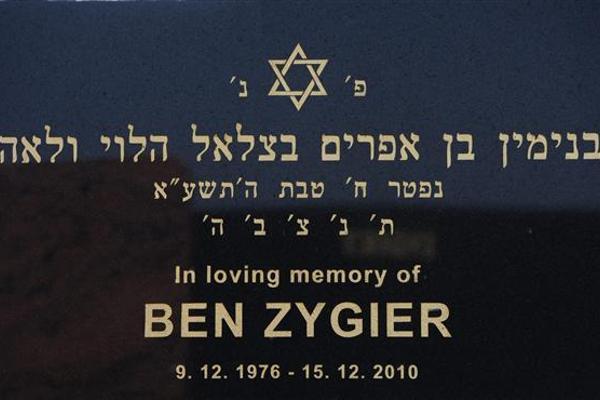Tough questions in Israel over mystery prisoner death
JERUSALEM - Agence France-Presse


The tombstone of Ben Zygier, known in Israel as Ben Alon, at the Chevra Kadisha Jewish Cemetery in Melbourne, Australia, 13 February 2013. EPA photo
Israeli MPs and commentators were on Wednesday asking tough questions about the mysterious detention and apparent suicide of "Prisoner X" after a TV report said he was an Australian Jew with ties to Mossad.Twenty-four hours after the emergence of an explosive investigative report by Australia's ABC news, the Israeli censor moved to ease the total blackout on coverage of the incident, allowing the local press to publish details from the report.
The story of the so-called Prisoner X first emerged in June 2010 when Israel's Ynet news website briefly ran a story about a prisoner being held in top secret conditions whose identity and crime was not even known to his jailers.
The story was quickly taken offline and a complete media blackout was imposed, but it reemerged on Tuesday when ABC identified the mystery prisoner as an Australian national who had been recruited by Israel's shadowy spy agency.
With tight reporting restrictions in place, the Israeli media was completely silent on the affair.
What they did report was that Prime Minister Benjamin Netanyahu had on Tuesday called an urgent meeting with the country's top editors to ask them to cooperate by "withholding publication of information pertaining to an incident that is very embarrassing to a certain government agency," Haaretz newspaper said, in a clear allusion to Mossad.
But shortly afterwards, three MPs raised questions over the issue in parliament, effectively sidestepping the censor in a move which forced a slight easing of the reporting restrictions.
In its report, ABC named the prisoner as 34-year-old Ben Zygier, a Jewish lawyer from Melbourne who moved to Israel in 2001 where he was known as Ben Alon.
It said he was working for Mossad, and that his arrest and incarceration was one of the most sensitive secrets of Israel's intelligence community.
Before he was arrested in early 2010, Zygier had been living in Israel for about 10 years and was married to an Israeli woman with whom he had two children, the channel said.
ABC had no information on why he was arrested but said he was taken to Ayalon Prison near Tel Aviv where he was held in virtual isolation. In December of that year, Zygier was found hanged in his cell, despite the fact it was equipped with state-of-the-art surveillance systems to prevent suicide, it said.
Although the press can now quote foreign media on details of the case, the restrictions bar any original reporting on the incident, a spokesman for the censor's office said.
"It is now possible to report what foreign sources are saying about this story," a spokesman told AFP, saying the main blackout was still in place.
"It is based on a court order from 2010 and covers anything which could indicate the reason for his arrest." In the ABC interview, Australian Foreign Minister Bob Carr said Canberra only became aware of Zygier's incarceration after his death and said he was troubled by the questions raised by the report.
But on Wednesday he confirmed he had ordered a review of the handling of the case. According to a report in The Australian, Carr ordered the review after finding out that an Australian diplomat in Tel Aviv had been informed by the Israelis about Zygier's incarceration but "had not passed on the information through the appropriate channels.
It said Carr was unlikely to demand clarifications from Israel without a demand from Zygier's family for an explanation.
But in Israel, the questions were coming thick and fast.
"Can you confirm that this Australian committed suicide in prison under a false name so it wouldn't be revealed he was being detained in Israel?" Arab-Israeli MP Ahmed Tibi asked during a parliamentary session on Tuesday.
Further questions were expected to be raised in parliament on Wednesday with outgoing Internal Security Minister Yitzhak Aharonovitch likely to be in the spotlight.
But former foreign minister Avigdor Lieberman attacked the MPs for using their parliamentary immunity to get around the censor.
"Once again, certain MPs don't hesitate to identify with the enemy and take advantage of their parliamentary immunity to violate censorship," he growled in an interview on Israel's army radio.
